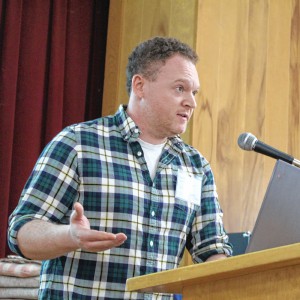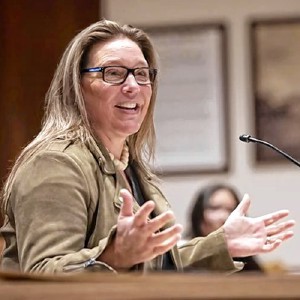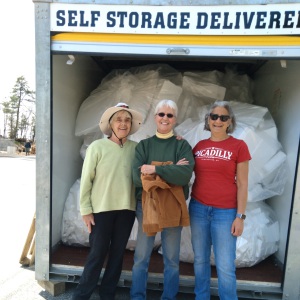New Leaf Energy nixes controversial battery storage project in Wendell

New Leaf Energy was interested in constructing a 105-megawatt lithium-ion battery storage facility at 68 Wendell Depot Road in Wendell, but project developer Ben Torda said on Tuesday that the company recently opted against it. CONTRIBUTED IMAGE
| Published: 08-06-2024 5:25 PM |
WENDELL — A Lowell-based developer of renewable energy and energy storage projects has pulled the plug on a controversial facility proposed for 68 Wendell Depot Road, citing changes in the interconnection process and the state Legislature’s failure to pass a climate bill last week.
New Leaf Energy was interested in constructing a 105-megawatt lithium-ion battery storage facility but project developer Ben Torda said on Tuesday that the company recently opted against it.
“We’re not going to develop the project,” he said. “It’s become clear over the past couple of months about what our decision would be.”
Torda explained the federal government has implemented changes to the interconnection process, which connects a facility to the electric grid. He said these changes are a net positive for the industry but they make the proposed Wendell Depot Road project unfeasible. He mentioned that New Leaf Energy had also expected the Massachusetts Legislature to pass a sweeping climate bill that would have established state procurement for energy storage projects, but the Senate and House were unable to agree on a mutually acceptable version before the legislative session ended.
Torda has drafted a letter to Laurie DiDonato, chair of the Wendell Selectboard, and Molly Doody, chair of the town’s Planning Board, to inform them of New Leaf’s Energy’s decision.
“Ultimately Massachusetts will need energy storage projects like this one to meet its climate and energy goals,” Torda writes in the letter, obtained by the Greenfield Recorder. “We are disappointed that the timing was ultimately not right to bring this type of investment to Wendell.”
He had no comment when asked in an interview on Tuesday what is next for New Leaf Energy, a standalone business of Borrego Energy.
The project’s proposal spawned the creation of No Assault & Batteries (NAB), a local citizens’ committee whose members felt the project was dangerous and inappropriate for their small town. The group was the driving force behind a bylaw, overwhelmingly adopted by Wendell voters at a Special Town Meeting in May, that was crafted to deal with the licensing of battery energy storage systems, including those powered by lithium-ion batteries. But Torda said the bylaw, which has yet to receive approval from the state Attorney General’s Office, had nothing to do with the company’s decision to nix the project.
Article continues after...
Yesterday's Most Read Articles
“It’s huge news for our town, [which] has been very vocal about it not being a good fit, not only for our town but the whole area,” Doody said in a phone interview on Tuesday afternoon. “I can’t help but feel our vocalization had something to do with it.”
No Assault & Batteries member Court Dorsey was elated by the update.
“That’s great news,” he said when reached Tuesday.
Dorsey mentioned his group’s cause has been accumulating support, including from the Leverett Selectboard in the form of a letter sent to the state assistant attorney general to advocate in favor of Wendell’s bylaw. Leverett Selectboard members Patricia Duffy and Jed Proujansky joined Chair Tom Hankinson in signing the letter to Margaret J. Hurley as part of the bylaw’s initial 90-day review period, which the state and Wendell’s town counsel had recently agreed to extend by another 90 days. The bylaw was passed at a Special Town Meeting by a vote of 100 to 1. Adopted or amended town bylaws require approval from the Attorney General’s Office.
“We add our mutual concern over the fire safety issues and air pollution impacts” associated with large-scale lithium-ion batteries, the Leverett Selectboard’s letter states.
Under Wendell’s bylaw, any battery energy storage system with a power rating greater than 1 megawatt and no more than 10 megawatts would require approval from the Wendell Licensing Board, which would be made up of Selectboard members as well as one member appointed from the Conservation Commission, Board of Health, Planning Board, Zoning Board of Appeals, Energy Committee, Municipal Light Board and Finance Committee. No battery energy storage proposal greater than 10 megawatts would be licensed.
“These are reasonable criteria to use, and regulations that follow adoption of the bylaw will create measurements for validation of each finding,” the Leverett Selectboard’s letter continues.
Projects would also have to meet all Wendell bylaws and regulations, National Fire Protection Association standards, state building code, and insurance and financial surety requirements.
The Leverett Selectboard letter also cites the NFPA as stating that lithium-ion batteries can be an effective, efficient source of power but they are likely to overheat, catch fire and even lead to explosions if damaged or improperly used, charged or stored.
“We believe this bylaw provides reasonable criterion for evaluating and licensing battery energy storage systems,” the letter continues. “Selectboards must take seriously the need to protect the health, safety and welfare of our residents and their property as a top priority. We believe the public wants, and expects, energy installations in the commonwealth to be safe and reliable.”
Due to the noise disruption to wildlife, the Wendell Conservation Commission had refused to permit the project. In January 2023, however, New Leaf Energy applied to the state Department of Public Utilities for a permit to proceed.
Dorsey said he is disappointed the state is not moving as quickly as he would like to combat the climate crisis.
“However, pausing the process in order to make sure that it’s done right and not at the expense of the environment, I believe, is a wise move,” he said. “And I suspect that the determination of the people in the town of Wendell, with the support of the town of Leverett, has at least something to do with New Leaf’s decision not to push upstream too hard, especially if the state is taking its time to see that it’s done right.”
State Rep. Aaron Saunders, who represents the 7th Hampden District, said the project faced extraordinary opposition in Wendell and he was pleased by the news.
“I think it is good for Wendell, given how New Leaf was going about trying to site that project — circumventing local bylaws, trying to avoid environmental oversight,” the Belchertown Democrat said. “We know we need renewable energy and energy storage, but it needs to be sited responsibly.”
State Sen. Jo Comerford, D-Northampton, said this was a David-versus-Goliath situation, with Wendell serving as a tenacious underdog. She said there is a lot of work to do at the state level to ensure communities like Wendell have the resources and protections they need to take on multinational corporations.
“And when I talked with [Executive Office of Energy and Environmental Affairs] leadership ... they acknowledged that Wendell was ground zero for large corporations wanting to site energy projects,” Comerford said. “I know there’s a great deal of relief on the part of my constituents in Wendell.”
Reach Domenic Poli at: dpoli@recorder.com or 413-930-4120.






 Avery’s General Store building in Charlemont for sale
Avery’s General Store building in Charlemont for sale Farm owners learn the importance of succession planning at Shelburne workshop
Farm owners learn the importance of succession planning at Shelburne workshop Tax amendment could safeguard state’s small farms
Tax amendment could safeguard state’s small farms Four collection weekends planned for Styrofoam in four Franklin County towns
Four collection weekends planned for Styrofoam in four Franklin County towns
